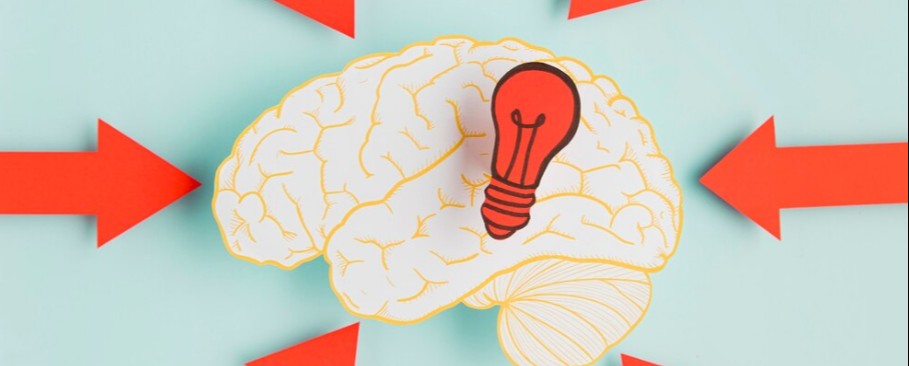
Link Between Food and Mental Health

Link Between Food and Mental Health
The saying "You are what you eat" resonates far beyond physical health; it extends to mental health as well. What we eat and how we eat can profoundly influence our mood, cognitive function, and overall mental well-being. Emerging research shows that food and food habits are deeply intertwined with mental health, affecting everything from our energy levels and stress resilience to anxiety and depression. This article will delve into the connection between food, food habits, and mental health, highlighting the mechanisms behind this link and offering practical strategies for maintaining a diet that supports emotional and psychological well-being.
The Food-Mood Connection: Understanding the Science
The relationship between food and mental health is complex, involving several biological and psychological mechanisms. Here are some of the key pathways that explain how what we eat can impact our mental state:
1. The Gut-Brain Axis
The gut-brain axis is a bidirectional communication system between the gastrointestinal tract and the brain, facilitated by the vagus nerve, hormones, and the immune system. The gut is often called the "second brain" because it contains millions of neurons and produces neurotransmitters like serotonin and dopamine, which regulate mood, anxiety, and emotional responses.
The gut microbiome—trillions of bacteria in the digestive tract—plays a crucial role in this communication. A healthy gut microbiome supports neurotransmitter production, reduces inflammation, and enhances the integrity of the gut lining. On the other hand, a disrupted gut microbiome, often due to poor diet, can lead to increased inflammation and "leaky gut," both of which are linked to mental health disorders like depression and anxiety.
2. Neurotransmitter Production
Neurotransmitters are chemical messengers that transmit signals between nerve cells in the brain and body. The production of key neurotransmitters like serotonin, dopamine, and norepinephrine depends on the availability of specific nutrients, such as amino acids, vitamins, and minerals. For instance, serotonin, which is crucial for mood regulation, is synthesized from the amino acid tryptophan. A diet lacking in tryptophan-rich foods (like turkey, nuts, and seeds) can impact serotonin levels and lead to mood imbalances.
3. Blood Sugar Regulation
Fluctuating blood sugar levels can significantly impact mood and energy. Diets high in refined sugars and simple carbohydrates can lead to rapid spikes and crashes in blood sugar, causing irritability, anxiety, and fatigue. On the other hand, a diet rich in complex carbohydrates, proteins, and healthy fats helps stabilize blood sugar levels, promoting sustained energy and a balanced mood.
4. Inflammation and Oxidative Stress
Chronic inflammation and oxidative stress are linked to several mental health conditions, including depression and anxiety. Diets high in processed foods, trans fats, and added sugars can promote inflammation in the body and brain. Conversely, anti-inflammatory and antioxidant-rich diets (such as the Mediterranean diet) have been associated with better mental health outcomes.
Food Habits and Their Impact on Mental Health
Beyond the nutritional content of the food we eat, our food habits—including how, when, and why we eat—also play a significant role in our mental well-being. Here are some critical food habits that can affect mental health:
1. Regular Eating Patterns
Maintaining a regular eating schedule helps regulate blood sugar levels and prevent mood swings. Skipping meals or erratic eating patterns can lead to dips in energy, irritability, and difficulty concentrating. Having balanced meals and snacks at consistent intervals can support stable mood and mental clarity.
2. Mindful Eating
Mindful eating involves paying full attention to the experience of eating—savoring each bite, eating slowly, and tuning in to hunger and satiety cues. Mindful eating has been shown to reduce emotional eating, stress eating, and binge eating, all of which are linked to poor mental health. It encourages a positive relationship with food, promotes self-awareness, and reduces anxiety around eating.
3. Emotional Eating and Comfort Foods
Emotional eating—using food to cope with stress, anxiety, or boredom—is a common response that often involves high-calorie, sugary, or fatty "comfort foods." While these foods may provide temporary relief, they often lead to feelings of guilt, low mood, and even increased anxiety or depression over time. Developing healthier coping mechanisms, such as physical activity, mindfulness, or talking to a friend, can help break the cycle of emotional eating.
4. Social Eating and Its Psychological Benefits
Eating is not just a physiological need; it is also a social activity that can foster connection and support. Social eating, whether with family, friends, or colleagues, has been associated with better mental health outcomes. Sharing meals can reduce feelings of loneliness, promote social bonding, and provide emotional support. It encourages slower, more mindful eating and can positively impact food choices.
Key Nutrients for Mental Health
Several nutrients have been identified as crucial for maintaining mental health and supporting brain function. Here’s a look at some of these essential nutrients and their sources:
1. Omega-3 Fatty Acids
Omega-3 fatty acids, particularly EPA and DHA, are essential for brain health and function. They help reduce inflammation, improve cell membrane fluidity, and enhance neurotransmitter function. Studies have shown that omega-3s can help reduce symptoms of depression and anxiety.
Sources: Fatty fish (salmon, mackerel), flaxseeds, chia seeds, walnuts, and algal oil.
2. B Vitamins
B vitamins, including B6, B9 (folate), and B12, are involved in producing and regulating neurotransmitters. Deficiencies in these vitamins have been linked to mood disorders, depression, and cognitive decline.
Sources: Leafy greens, legumes, whole grains, eggs, dairy, meat, and poultry.
3. Vitamin D
Vitamin D is often referred to as the "sunshine vitamin," and it plays a role in brain function and mood regulation. Low levels of vitamin D have been associated with depression and seasonal affective disorder (SAD).
Sources: Sunlight exposure, fatty fish, fortified dairy products, and egg yolks.
4. Magnesium
Magnesium is known as the "anti-stress" mineral because it helps regulate neurotransmitters, supports relaxation, and reduces anxiety. Low magnesium levels have been linked to increased stress, anxiety, and depression.
Sources: Nuts, seeds, leafy green vegetables, whole grains, and legumes.
5. Antioxidants
Antioxidants, such as vitamins C and E, and polyphenols, protect brain cells from oxidative stress and inflammation, both of which are linked to mental health disorders.
Sources: Berries, citrus fruits, nuts, seeds, dark leafy greens, and green tea.
Practical Dietary Strategies for Supporting Mental Health
- Adopt a Balanced Diet: Aim for a diet rich in whole, nutrient-dense foods like fruits, vegetables, whole grains, lean proteins, and healthy fats. Minimize processed foods, sugary snacks, and refined carbohydrates that can negatively impact mental health.
- Include Probiotics and Prebiotics: Support a healthy gut microbiome by including probiotic-rich foods (yogurt, kefir, sauerkraut) and prebiotic-rich foods (garlic, onions, bananas) in your diet. A balanced gut microbiome is crucial for mental health.
- Stay Hydrated: Dehydration can affect mood and cognitive function. Make sure to drink enough water throughout the day to stay hydrated and support overall brain health.
- Practice Mindful Eating: Slow down and savor each meal. Pay attention to your body's hunger and fullness cues, and try to eat in a relaxed environment without distractions.
- Avoid Emotional Eating Traps: Develop alternative coping strategies for managing stress and emotions, such as exercise, meditation, or talking to a friend, rather than turning to food for comfort.
- Seek Professional Guidance: If you have specific dietary concerns or mental health conditions, consider consulting a registered dietitian or mental health professional for personalized advice.
Conclusion
The link between food, food habits, and mental health is clear and compelling. A well-balanced diet and mindful eating practices can positively influence mood, cognitive function, and overall mental well-being. By understanding the importance of nutrition and adopting healthy eating habits, we can take proactive steps toward supporting our mental health and leading a more balanced, fulfilling life. Remember, nourishing your body is also a way of nourishing your mind.
Articles
Build your awareness and get inspired with our researched articles on how you can strengthen your well-being
Popular Topics
An OTP has been sent to the email address
provided.
Please check your Inbox and Spam folders.

What Would You Like to Speak with a Specialist About?
Mental Fitness Journey starts Now!
Chearful Connects you with Top-tier Qualified Wellness specialists for the Price of a cup of Coffee!

Next Steps
- A Client Team member will reach out to you to schedule a session with the most suitable specialist.
- You will receive an email with a 10% Discount Code* for your 1st session.
- We invite you to Explore the Platform & Sign Up today! *Upto a maximum of $10 discount on a session purchased




 3349 Read
3349 Read


























